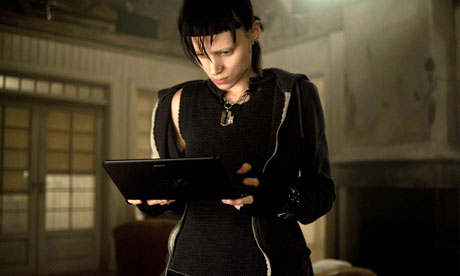
When Rooney Mara picked up an Oscar nomination for her punchy central performance in David Fincher's American remake of The Girl With the Dragon Tattoo (2011, Sony, 18), one question hung awkwardly in the air: how come Noomi Rapace wasn't similarly honoured for her equally impressive turn as cyberpunk Lisbeth Salander in the original Scandinavian movie a couple of years earlier? Adapted from the first of Stieg Larsson's posthumously bestselling Millennium trilogy, Niels Arden Oplev's modestly budgeted thriller made a European star of the mercurial Rapace, who went on to feature in Sherlock Holmes: A Game of Shadows and is soon to be seen headlining Ridley Scott's eagerly anticipated sci-fi epic Prometheus. It's hard not to conclude that, while Rapace delivered her dialogue in Swedish, Mara was feted for performing essentially the same role in English – albeit with the merest hint of a Scandi-lite accent.
This is a dilemma that lies at the heart of Fincher's movie, raising depressing questions about the reluctance of English-speaking audiences to embrace the international language of subtitles. While few would argue that Oplev's Bafta-winning take on Larsson's text was beyond improvement, it's hard to see what – other than visual sheen – Fincher has brought to the table. Preserving the Swedish locations merely emphasises the fact that all the problems of the original remain: the rather too-neat narrative knots; the overwrought political parables; the somewhat unsatisfying denouement; the uncomfortable juxtaposition of melodramatic hokum and horribly explicit sexual violence. Fincher's version is certainly shinier, most notably in an oily, Bond-style opening sequence that may fit the presence of leading man Daniel Craig (more of whom in a moment) but sits uneasily with the gloom-laden tone of what follows. And while Mara's ass-kicking Salander offers a welcome retort to Hollywood's traditional lack of varied roles for women, the only thing that really distinguishes her heroine from Rapace's genre-defining avenging angel (other than her language) is her haircut.
In the end, this remake sticks close enough to its predecessor to make you wonder why they bothered. You can check out Rapace's matchless performances in all three original movies in Momentum's Millennium trilogy boxed set for around the same price as the new first instalment. You pays your money, you takes your choice.
Somewhere in the overcooked A-lister pudding of Dream House there's an interesting B-movie bug-house shrieker struggling to get out. Sadly, what low-budget charm this psycho-fantasy should possess (look at what John Carpenter did with similar but cheaper material in The Ward) is buried alive under $55m-worth of mainstream compromise and inevitable studio wrangling, resulting in the public dissatisfaction of director Jim Sheridan and leading players Daniel Craig and Rachel Weisz.
Craig is actually pretty good as the haggard and haunted husband whose dream home becomes a nightmare that robs him of his family. The "big reveal" comes so early on in the proceedings that it can hardly be described as a twist, although cinematographer Caleb Deschanel does a fine job of blurring the line between what is real and imagined. Initially promising but ultimately disappointing, this is best summed up in Craig's own admission that: "The movie didn't turn out great, but I met my wife – fair trade!"
What an intriguing, and unsettling little movie Black Pond (2011, Black Pond, 15) is. At the Baftas its makers (director Tom Kingsley, writer/director Will Sharpe and producer Sarah Brocklehurst) were nominated for an outstanding debut award, and there is plenty here to suggest that they are an ever-so-slightly surreal force to be reckoned with. The story of a family who unwittingly achieve tabloid notoriety as a killer clan, the film mixes faux documentary interviews with off-kilter (and carefully coloured) scenes from a waking dream of life, interspersed with animated legends of lost ladies of the lake and three-legged dogs. It's peculiar stuff, occasionally funny, often poignantly uncomfortable, and consistently weird, like some subdued English relative of David Lynch's American gothic oeuvre. Chris Langham and Amanda Hadingue provide a suitably awkward mainstay as the collapsing couple at the centre of the drama, although Simon Amstell appears occasionally to have wandered in from a different (and more overtly comedic) movie as a madcap phoney shrink taunting Sharpe's mockable Tim. Extras include deleted scenes and the Sharpe/Kingsley short film Cockroach.
Billed as "a tale of love, lust, loss and longing" played out entirely in rhyming couplets, Acts of Godfrey (2011, Guerilla, 15) deserves plaudits for taking a running jump at the kind of insurmountable "obstacle" that would have doubtless delighted Lars von Trier. To writer-director Johnny Daukes's credit, the point at which one settles into the linguistic metre arrives pretty early on, achieving a sort of quasi-Chaucerian lilt that is surprisingly easy on the ear. The performances are committed too, with a rogues' gallery of British comedic thesps (Simon Callow, Harry Enfield, Celia Imrie, the splendid Doon Mackichan) lining up to play their part. A shame, then, that the puppets-of-fate narrative never quite takes flight, descending rather too often into pantomime pastiche and broader-than-broad Carry On oompah. Still, on the evidence of this I'd be willing to give the rhyming couplets another bash, which is saying something, frankly.

